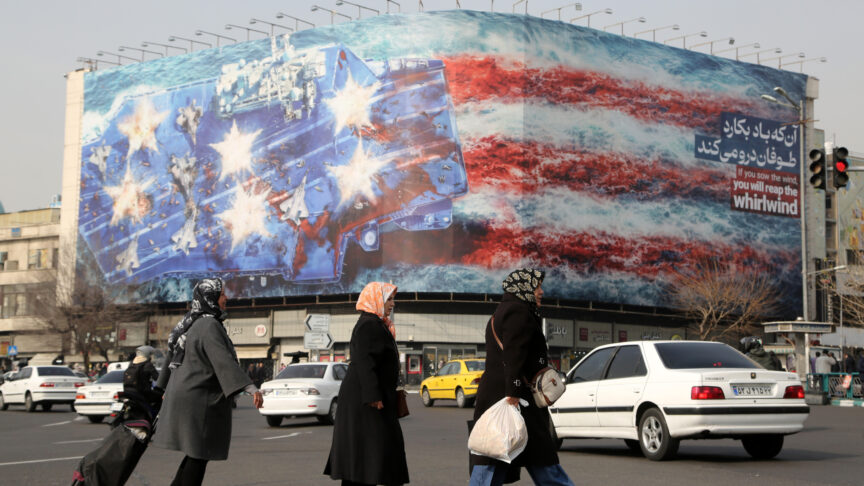How to Revive EU Policy on the Israeli-Palestinian Conflict
EU needs to better demonstrate the incompatibility of occupation policies with the continued development of relations with the EU.
The EU’s foreign policy chief Federica Mogherini will today begin her second trip to Israel and the Palestinian Territories. Top of her agenda will be holding talks with Prime Minister Benjamin Netanyahu and President Mahmoud Abbas with a view to re-launching negotiations.
Mogherini’s visit comes at a critical time for EU policy towards the Israeli-Palestinian conflict. Netanyahu’s re-election for a fourth term after a campaign in which he publicly disavowed a two-state solution, and the subsequent formation of a narrow right-wing coalition dominated by pro-settlement ministers, has added yet more uncertainty regarding the continued viability of the two-state approach. As the two-state paradigm is one of the EU’s longest-held foreign policy objectives, its demise could have a major impact on the EU and its bilateral engagement with Israel and the Palestinians.
To anyone familiar with the political discourse emanating from Israel, Mogherini’s announcements that she looks forward to working with the next Israeli government in order to reach a “comprehensive, stable and viable settlement of a conflict” could seem like unbridled sarcasm. More so given that Netanyahu’s statements since the 1990s reflect a consistent opposition to the creation of a viable and territorially contiguous Palestinian state. Netanyahu’s terminology may have changed over the years, but his vision remains unwavering: Israel shall retain de facto control of the area between the Jordan and the Mediterranean with different degrees of autonomy for densely populated Palestinian areas. Moreover, the Likud leader made a clear choice when he boxed himself into a right-wing coalition that can be counted upon to thwart any substantive move towards a Palestinian state.
A meaningful peace process is therefore unlikely to restart merely because of European positive thinking. Although Mogherini has yet to fully spell out her vision for a renewed peace push, its contours have already begun emerging. This has included her appointment of Fernando Gentilini as the EU’s new Special Representative for the Middle-East Peace Process. The High Representative has also made frequent reference to reviving the Middle-East Quarter and carving out a bigger role for the Arab League, which would likely include re-floating once again the Arab Peace Initiative. These measures have of course been tried many times before, and given that the Quartet and Arab League exhibit as much vitality between them as the peace process itself, the chances that such a push will be any more successful than previous US attempts are remote.
EU actions should however not be understood as an attempt at conflict resolution, but rather as a conflict management mechanism. After years of failed negotiations, sustaining a peace process has become the goal in itself, regardless of whether it can actually deliver an agreement, or even secure progress or prevent slippage. The EU’s ability to continue down this make-believe path depends, however, on Israel at least paying lip service to the two-state solution. Even if Israeli actions in the Occupied Palestinian Territories (OPT) remain in stark opposition to the creation of a Palestinian state, rhetorical support from the Israeli government affords European states a degree of “calculated naiveté”. So long as it goes nowhere, maintaining the semblance of a peace process is also useful to Israel, allowing it to deflect international pressure over its settlement project.
The convenient fiction that Benjamin Netanyahu would pursue the two-state solution has however dissipated both with European publics and with President Obama who announced an official US policy re-assessment as a result. An Israeli government that makes no effort to hide its pro-settlement orientation and expands a settlement project that runs counter to Europe's vision for resolving the conflict will make it harder for European leaders to hide behind the United States and a dead-ended peace process. Merely extracting another heavily caveated public proclamation from Netanyahu re-affirming his commitment to a two-state solution and negotiations will though do little to bring about the kind of change Mogherini has spoken of.
There may of course be little willingness to substantially rethink the EU’s approach to the conflict or indeed any real appetite to engage in the sort of bold political actions recently advocated by a group of former European leaders, such as introducing political conditionality into the EU’s relations with both parties, engaging with Hamas, and actively promoting accountability for violations of international law. But there is still much that Europe can and should do in order to keep alive the idea of a two-state solution and counter the pro-settler discourse emanating from Israel.
In a situation in which the Israeli government has moved further away from supporting a two-state solution and in which settlements are publicly acknowledged by the EU as representing an obstacle to peace, stepping up measures designed to enforce the Green Line is consistent both with the numerous Foreign Affairs Council declarations issued by the EU over the years and with Europe's adherence to international law. Differentiating between Israel and its settlements within the EU’s bilateral relations is also the most effective course of action open to the EU. Above all, this entails strengthening EU non-recognition of Israeli attempts to impose de facto (if not yet de jure) sovereignty over those parts of the West Bank directly under its control.
The EU has already taken a number of steps in this direction, such as excluding certain settlement products from EU markets on technical grounds, and ensuring that Israeli entities based or otherwise operating in the OPT are excluded from receiving funds through the EU’s flagship R&D programme, Horizon 2020. Nevertheless, such policies have until now only been implemented in an ad hoc manner, meaning that the EU is underusing a potentially important tool.
As in other areas of foreign policy, bringing declaratory and actual policy into line, though inevitable, needs a certain amount of political will. But to the extent in which EU political actors do find themselves under pressure from their own constituencies to act in order to preserve the viability of a Palestinian state, a policy based on upholding the EU’s own legal obligations represents the best means for consensus-based action.
European leaders should also remember that it is Israel that has a difficult choice to make, not Europe. Israelis should be confronted with a simple question: Does Israel’s future lie with Europe, or with the settlements? To do so, the EU needs to better demonstrate the sheer incompatibility of settlement building and other occupation policies with the continued development of relations with the EU. Such a policy can affect Israel’s political narrative regarding settlements, and feed into the domestic Israeli debate on the long term unsustainability of the status quo by demonstrating to Israelis that their actions in the Occupied Territories result in real day-to-day consequences.
The European Council on Foreign Relations does not take collective positions. ECFR publications only represent the views of their individual authors.


